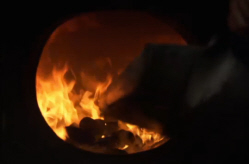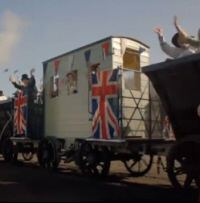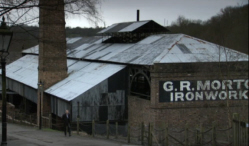The Industrial Revolution began in the immodestly named Great Britain

300 years ago, something new appeared above the surface of the planet. A thick, oily spectre, hanging in the air. For longer than the cooking smoke from any town or city, and larger than a forest fire or a volcano. The Industrial Revolution was the biggest story to happen to mankind since we invented farming. And that dirty smear of smoke spread across North America, much of Europe, China, Japan. But it first billowed into the air over a modestly sized little island which called itself, rather immodestly, Great Britain.
The engine for all of this was… the engine. Steam engines burned up the buried energy of millennia, captured in coal, and used it to create immediate power.
What a moment! Through all of history, one thing had never changed - there was a fixed limit on the amount of power that humans could use. Their own muscles, a few animals, the odd windmill and water wheel. But soon, steam engines would be doing as much work in Britain as 40 million people flat-out.
Why did this happen in Britain? Was it because the British were uniquely clever?
No. Was it because the country seemed to be half built on coal? Not really. It was because the British had developed a new political system which limited monarchy, gave everybody legal rights, allowed the free flow of ideas, and ensured that British geniuses owned their ideas, so they could make a buck.
Liberty of Ideas, Freedom to Profit

Enough liberty for free ideas, enough law for profit. Allowing the emergence of new men, far from the haunts of the rich and powerful. Men like George Stephenson, who in 1825 was busy connecting two towns in the north of England.. Stockton and Darlington.
A man who’d been illiterate until he was 18, driving his own invention, an awkward-looking mash-up of pipes and fire he called simply “Locomotion”.

Stephenson’s machine was the biggest news of the age. “Locomotion” had been built to carry coal, but on its maiden voyage, people clambered into the coal carts. There was even an experimental passenger carriage called “Experiment”.
Never before had so many people been carried so far… so fast. Now railways would start to knit together nations. First Britain… but soon the United States, Germany and the rest of Europe. Restless change, restless revolution.

Like most revolutions, the industrial revolution would have many casualties. Men and women and children as young as eight or nine worked 12-hour days in the vast factories. Many were maimed or even killed by the new machinery, and they were working by artificial light and the factory clock, not the rhythms of nature.
Protests were widespread and angry. Every great new technology produces changes in society and politics, and these new engines didn’t just push pistons and locomotives, they pushed ahead trade unionism, town planning, political reform, new schools, democracy.
Quite powerful things, steam engines.

Britain went through the fastest social transformation in history. People flooded from the countryside to work in urban factories. Within a century, Britain went from a country with just two cities with more than 50,000 people to a country with 29 cities of this size.
It’s very similar to what’s happening in China right now - a world of peasant farmers becomes a world of factories, the village’s empty, and tall angular buildings spring up.
By 1860, Britain was tied together by more than 10,000 miles of railways. Production of coal and steel and iron skyrocketed. The cities sprawled, and new inventions - from steamships and iron bridges to brilliantly lit streets - tumbled out of these damp and smoky islands.
And it was really this energy, this restless search for raw materials, new markets and bigger profits, that drove the British as they threw together the biggest empire in the history of the world.
There have always been powerful empires and weaker peoples, rich countries and poor ones. What was new about the Industrial Revolution was that it brought a great steel barrier crashing down between the nations with the new power and the rest without it. Which, in 1839, included China.
